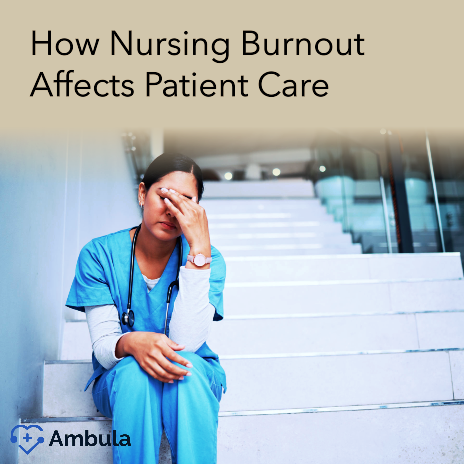
Have you ever felt burned out at work? We all have, right? Consider a nurse’s job – long hours, intense emotional situations, and physical demands. Unsurprisingly, nursing burnout is a significant concern in the healthcare industry. More importantly, it has a profound impact on patient care. This blog post will delve deep into nursing burnout – what it is, how it impacts patient care, and what we can all do about it.
Burnout is more than just being tired; it’s about feeling unappreciated, stuck, and devoid of enjoyment in a job that was once fulfilling. Now, couple those feelings with the immense physical and emotional burdens of nursing, and you have a recipe for a crisis. Let’s take a walk in the shoes of a nurse to better understand this, and, ultimately, find solutions for it.
Studying and understanding nursing burnout is critical. Recognizing the issue can help us to consider changes in personal behaviors, management techniques, and policy changes that can alleviate the problem. Because ultimately, excellent patient care is highly dependent on excellent nurse care.
Understanding Nursing Burnout
When we talk about nursing burnout, what does it look like? It manifests as mental, physical, and emotional exhaustion caused by chronic work stress. Factor in the extremely emotional nature of nursing, which often requires nurses to deal with sick, suffering, and dying patients regularly, and the situation worsens.
Is burnout an isolated case, then? Unfortunately not. The rate of nursing burnout is alarmingly high on a worldwide scale. Nursing burnout is a widespread issue affecting healthcare systems globally, from hospitals in downtown New York to rural clinics in Africa.
So, what lies behind nursing burnout? It emerges from a complex concoction of factors – long working hours, high job demands, emotional pressure, and often a lack of control over one’s work. This understanding of the causes is vital in figuring out how to overcome nursing burnout and equip nurses to better handle work stressors.
The Direct Impact of Nursing Burnout on Patient Care
Now, let’s talk about the elephant in the room – how does nursing burnout affect patient care? Burnout hampers nurse’s ability to function at their best. Overwhelmed with exhaustion and stress, the quality of care they can provide naturally diminishes. It’s unsurprising that research frequently highlights a clear correlation between nursing burnout and a decline in patient care quality.
Are patients aware of this? Absolutely. Higher rates of nursing burnout usually coincide with lower levels of patient satisfaction. Empathy, attention, and energy levels, while important in any job, are crucial in nursing. But, when a nurse is burnt out, these key ‘soft skills’ often dwindle.
Here’s a more sobering fact – medical errors. Mistakes happen. Nurses are human beings. There’s a reason why doctors have nurses double-check important work-related matters and vice versa. Burnout amplifies the likelihood of errors, from administering medication to recording patient information. That’s a dangerous possibility no one wants to imagine.
The Emotional Toll of Burnout on Nurses
Can we talk about feelings for a moment? Emotional exhaustion is a massive part of burnout, and it couldn’t be more relevant than in the case of nurses. Nurses daily deal with emotional highs and lows – it’s not, nor has it ever been, just a job to them.
So, when nurses are battling burnout, they often report feelings of indifference or detachment. This is a coping mechanism to deal with emotional exhaustion, but one that impacts their interactions with patients. Such impersonal, non-empathetic interactions can form barriers between nurses and patients, hindering effective treatment and healing.
Nursing burnout also takes a toll on a nurse’s health and well-being. Burnt-out nurses can experience more physical ailments and sleep difficulties and are at a higher risk for developing conditions like depression. This often creates a vicious cycle- the more burnt out a nurse feels, the less effective they are at work, and the less effective they are at work, the more their burnout exacerbates.
Nursing Burnout and Patient Safety
Let’s talk about patient safety. It’s every healthcare provider’s number one priority. However, when a nurse is burnt out and unable to function at their best, patient safety may be compromised.
Burnt-out nurses are more likely to be involved in patient falls, medication errors, and infections. For instance, an exhausted nurse might accidentally switch two patient’s medications, or a burnt-out nurse might not wash their hands thoroughly, increasing the risk of transmitting infection.
Not only does this have significant implications for patient health, but it also heightens the chances of readmission, which is stressful for patients and their families and has significant financial implications for healthcare organizations.
Impact of Nursing Burnout on Patient Recovery and Healing
Nurses play an indispensable role in the recovery and healing process of patients. However, a nurse struggling with burnout may inadvertently impact a patient’s recovery journey. For instance, a burnt-out nurse may miss subtle clues about a patient’s condition, leading to delays or problems in treatment.
An essential part of patient recovery entails the relentless assessment of their progress— their vital signs, ongoing treatments, side effects, etc. If a nurse is burnt out, they may struggle to adequately perform this critical role of ongoing patient monitoring.
Moreover, nurses often play a pivotal role in educating patients about their conditions, medications, and lifestyle changes needed for recovery. However, burnt-out nurses may not always be in the best state of mind to offer optimal education and counseling, which can interfere with patients’ recovery.
Nursing Burnout and Patient Trust
Trust – it’s a critical element in healthcare. A patient’s trust in their healthcare provider can profoundly impact their experience and outcomes. But when a nurse is battling burnout, maintaining and building this trust can get tough.
Nurses play a pivotal role in building patient trust with their profession, bedside manner, and demonstration of competency. Through their continuous proximity to the patient, they help cultivate a feeling of safety and comfort in the patient. However, a burnt-out nurse grappling with emotional exhaustion and cynicism may unintentionally compromise this trust-building process.
This compromise in trust can be due to perceived indifference, lapses in patient care, or lack of essential communication by burned-out nurses. Consequently, diminished patient trust could negatively impact patient satisfaction, engagement, and adherence to medical instructions.
Organizational Impact of Nursing Burnout
Nursing burnout doesn’t just impact individual nurses and patients; it also takes a considerable toll on healthcare organizations.
Firstly, there is the issue of turnover. Burnout is a significant factor causing nurses to contemplate leaving their jobs. Recruiting and training a new nurse is costly and time-consuming, placing further economic strain on an already overburdened healthcare system.
Add to this the cost associated with nurse absences or decreased productivity due to burnout, and it’s clear how massive an economic burden nursing burnout can be. With far-reaching implications for patient care quality, patient safety, nurse retention, and the bottom-line financial health of the organization, addressing burnout should be a top priority for any healthcare organization.
Strategies to Prevent and Reduce Nurse Burnout
Finally, let’s talk about the brighter side and strategies to handle and hopefully prevent nursing burnout. This discussion is not just of academic interest; it’s an essential blueprint for healthier nurses, safer healthcare settings, and better patient outcomes.
One practical approach to managing nurse burnout is positivity training and resilience enhancement strategies. Incorporating these into nursing education and professional development programs can equip nurses to better manage stressors and enhance their coping mechanisms.
Further, organizational strategies can significantly help. Healthcare organizations need to foster a supportive environment, ensuring adequate staffing, balanced workloads, and opportunities for professional growth. Incorporating regular downtime mental health resources and cultivating a culture where nurses can voice their concerns without fear of retribution is also crucial.
Remember, everyone in the healthcare system, from management to clinicians, therapists, nurses, and patients, has a role in combating nursing burnout.
Conclusion
In healthcare, where lives are at stake, the concept of caregiver burnout needs immediate and effective solutions. Nursing burnout is not just about the health and well-being of nurses; it impacts patient care, safety, and recovery. Acknowledging the issue, understanding its implications, and implementing effective strategies to combat it is our collective responsibility. After all, taking good care of our nurses is a prerequisite for them to take good care of us. It’s high time we all worked together to extinguish nursing burnout, paving the way for a healthier tomorrow.




